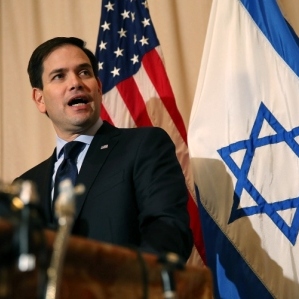Lifestyle/Community
Israel emerges as campaign issue in three big Jewish states
Ahead of this week Tuesday’s critical primary contests in five states, three of which – Ohio, Illinois and Florida – have substantial Jewish communities, Israel had prominently emerged as a presidential campaign issue. In a heated exchange in the Republican debate last week in Miami, front-runner Donald Trump was hammered by his opponents for saying he would be a neutral broker of Israeli-Palestinian peace. Trump defended his position as essential to achieving a peace deal between Israel and the Palestinians.

RON KAMPEAS
WASHINGTON
Pictured : Republican presidential candidate Marco Rubio speaking at a news conference at Temple Beth El in West Palm Beach, Florida, last week Friday. Losing his Florida home state to frontrunner Donald Trump in Tuesday’s primary elections, Rubio has withdrawn from the race. Voting took place in five states – Florida, Illinois, Missouri, North Carolina and Ohio. Trump won in all except Ohio which went to Ohio Governor John Kasich.
PHOTOGRAPH: JOE RAEDLE/GETTY IMAGES
“The policy Donald has outlined, I don’t know if he realises, is an anti-Israeli policy,” Florida Senator Marco Rubio – who has since withdrawn from the race – said at the debate. “Maybe that’s not your intent, but here’s why it is an anti-Israeli policy: There is no peace deal possible with the Palestinians at this moment.”
The real-estate magnate parried the criticism by noting both his love for Israel and the fact that his daughter Ivanka Trump had converted to Judaism when she married Jared Kushner, the scion of another real-estate family.
He said his promise of neutrality was essential to achieving a peace deal.
The Israel discussion was the most expansive one on the subject in any Republican debate this season, and it continued even after the debate concluded. Rubio’s campaign sent an e-mail blast immediately after with the subject line “Trump Is No Ally to Israel”.
Last Sunday Rubio took aim at Trump: “We are electing the next commander-in-chief, and when the one leading in the polls will not take sides, imagine if he were president?”
On Sunday, Ohio Governor John Kasich, also needing a win in his home state on Tuesday (which he managed to do), said on Fox News that he now favours suspending the Iran nuclear deal. Until now Kasich, like Trump, had said the deal was a bad one, but that he would first consult with experts before suspending it. Kasich said his mind was changed by Iran’s recent ballistic missile tests.
Ted Cruz, the last of the four remaining contenders for the Republican nod, took his pro-Israel message to voters through social media, a campaign official told JTA, reminding them of his pro-Israel activism in the Senate.
Hillary Clinton, the front-runner in the Democratic race, had also been reaching out to Jewish voters ahead of the Florida primary. But her message had emphasised not so much her differences with Bernie Sanders, the Independent Jewish senator from Vermont who has mounted an unexpectedly tough challenge for the nomination, but more the threat Trump poses to Israel.
A Clinton surrogate, Robert Wexler, a former congressman from Florida, in a weekend op-ed in the state’s Sun-Sentinel newspaper, warned that neither Sanders nor Trump has the understanding necessary to handle the Middle East, though he didn’t name either candidate.
But Trump does have some Jewish backers. Philanthropist Jacob “Hank” Sopher ran a full-page ad in the Miami Herald last Sunday calling for Jewish support for Trump, calling him “a man of integrity, a friend of the Jewish people, a friend of Israel”. JTA)